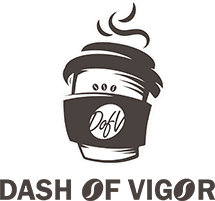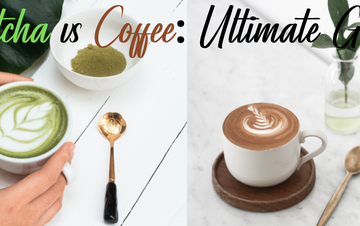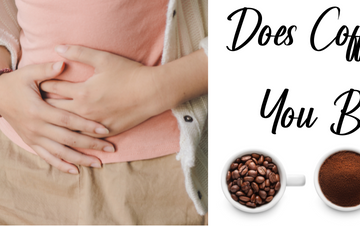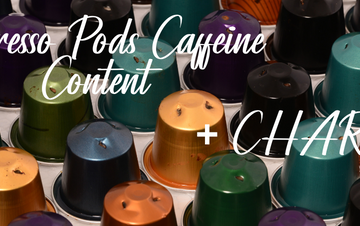Do Apples Have Caffeine?
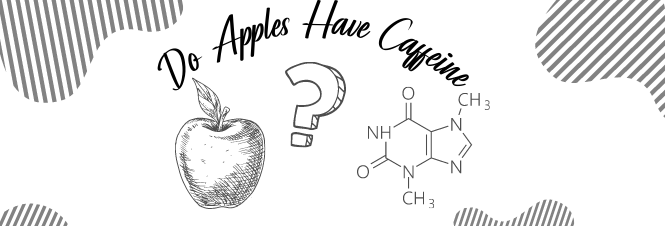
A cup of coffee always comes to the rescue when we are trying to get out of bed in the morning. But, can apples provide us with more energy than coffee? Do Apples Have Caffeine that can wake us in the morning?
These fruits not only contain all of those antioxidants, but they can also help you wake up. Yes, amazing, right?
I decided to conduct an extensive study on the issue and share my results. When it comes to energy, I discovered the difference between apples and coffee.
The first step to take is to look at the nutritional value of apples and coffee. In comparison to other fruits, apples have a higher content of vitamins and minerals. To give you a visual of how nutrient-rich this fruit is, here are a few nutrients you can find in it: Vitamin C, Vitamin E, Potassium, Fiber, and Lycopene. They also contain flavonoids which help protect against cancer and heart disease. You can also find beta-carotene in apples that help your vision. And more those are only a few benefits.
Caffeine is the primary element in coffee.
But do apples have caffeine?
Apple contains caffeine in very small amounts. The amount of caffeine in apples depends on the variety of the apple. One cup of coffee has about 120 milligrams of caffeine which is a lot more than an apple has – about 10 milligrams.
But how do they increase our alertness and productivity? Would it be better if we switched our morning coffee with apple juice? Will eating apples keep you awake longer than a big cup of coffee? If that’s the case, what happens if you consume some immediately before going to bed?
Let’s see what happens.
TABLE OF CONTENTS:
- Do apples have caffeine, keep you awake and provide more energy than coffee?
- Energy: slow sugar release vs. caffeine burst
- What about a glass of apple juice?
- What if you eat an apple immediately before bedtime?
Do apples have caffeine, keep you awake and provide more energy than coffee?
Surprisingly, I discovered that many individuals think apples contain naturally occurring caffeine throughout my investigation. Nonetheless, this fruit’s stimulating characteristics come from various sources.
Even while apples do not contain caffeine, they have natural carbohydrates that energize your body. Due to its high fiber content, an apple energizes you gradually without causing sudden energy level spikes.
Coffee, on the other hand, wakes you up with caffeine. That has a more noticeable effect on the body. It will dramatically increase your attentiveness while quickly getting you up and running.
Overall, apples can help you stay awake, but coffee is greater at elevating your alertness instantly.
Energy: slow sugar release vs. caffeine burst
Or, in other words: apples vs. coffee? It is manifest that the more calories a meal or drink has, the more energy it supplies your body.
A medium-sized apple has around 95 calories, so eating one will leave you feeling invigorated. An 8 fl. oz. cup of black coffee, on the other hand, has only 1 calorie, according to the USDA.
Caffeine is responsible for your cup of invigorating benefits, especially if you consume it unsweetened.
The quantity of adenosine neurotransmitters grows with time, making us weary and dazed.
Caffeine can energize us by mimicking an inhibiting neurotransmitter (adenosine). The last one induces sleep and makes us drowsy during the day.
Caffeine enhances dopamine levels by attaching the adenosine receptors, which is why we feel happier, more alert, and well-focused after drinking coffee. That’s how you fool your body into feeling more invigorated without consuming any calories.
Caffeine, of course, has varied effects on different people. If you consume coffee that does not work for you, there are two possible reasons for this phenomenon. First, it is possible that your metabolism processes it faster or you have developed a tolerance to caffeine.
A medium-sized apple has 0.7 ounces (19 grams) of sugar, which, together with all of its beneficial vitamins and minerals, is absorbed into the bloodstream. This sugar is not absorbed all at once. Therefore there will be no sugar crash. A medium-sized apple also has 0.15 ounces (4.4 grams) of soluble and insoluble fiber. Soluble fibers aid delay digestion. That means sugars from the apple are released gradually, avoiding increased blood glucose and insulin levels.
As a result, there is a clear distinction between the stimulating effects of apples and coffee. You will not receive a rapid rush of energy after eating an apple, as you would after drinking a cup of black coffee. The apple you eat will keep you awake and active without causing excessive excitement, jitters, or energy drops.
Coffee will get you going much faster by significantly enhancing your alertness and productivity. You may use that information to determine when to utilize one over the other: If you’re used to drinking coffee in the morning and swapping in an apple, the fruit’s alertness may be too mild for your preferences. Nonetheless, substituting an apple for your afternoon cup of coffee might keep you going till the night without messing with your sleep. You will gain all of the benefits of eating apples as a result.
What about a glass of apple juice?
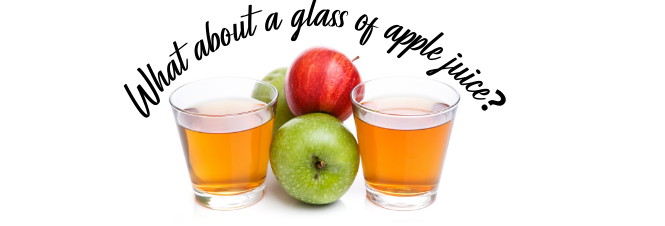
You’re probably wondering if drinking apple juice would provide you with a burst of energy. To answer appropriately, I must first explain the relevance of its glycemic index. This figure indicates how quickly or slowly a meal raises blood glucose levels. Because of their fiber, apples, as previously said, release their sugars slowly. That means they have a low glycemic index (below 55) – 36 to 38, to be exact.
Apple juice, on the other hand, has less fiber. As a result, its glycemic index is somewhat higher – 41 to 43. Glucose levels will rise at a faster rate than if you ate a whole apple. At the same time, a cup of apple juice includes at least three medium-sized apples. That will result in a threefold rise in the quantity of sugar we consume.
Furthermore, apple juice is frequently offered with additional sugars, which raises the glycemic index of the drink even further. That implies after drinking a bottle of store-bought apple juice. You will feel energetic immediately, but you may have a sugar crash shortly after that. As a result, we may feel much worse than before we drank.
To avoid a sharp decline in energy levels, I recommend drinking only unsweetened apple juice. Even though it does not contain caffeine, apple juice can energize you for a brief amount of time. It will, however, not keep you awake and sufficiently energetic for as long as consuming an entire apple would.
What if you eat an apple right before going to bed?
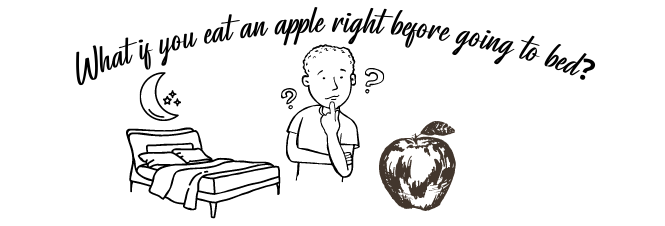
We already know that apples are pretty effective if we want to keep us awake and improve our energy levels. Does this mean we should not eat an apple before bed?
So what are the benefits of eating an apple at night?
Apples are nutrient-dense and make a fantastic late-night snack. If you frequently wake up in the middle of the night with food cravings, eating an apple before bed may help. Because of its high fiber content will keep you full throughout the night, preventing you from reaching for junk food. However, some people with digestive disorders may suffer pain after eating an apple, making it challenging to go sleep. In acid-sensitive persons, green apples may also trigger acid reflux symptoms. That being said, apples are a delicious way to end the day, and their nutrients may help keep the doctor away.
To get the most out of the fruit, eat it with the skin on. The skin of an apple contains a lot of antioxidants. Apples have a lot of health benefits. They are considered to be a superfood. It can also provide fiber, vitamins, and nutrients. The inside contains the seeds and core of the apple. Eating an apple this way helps wash away bacteria and germs when you bite into it. You can also mix it in with your cereal, yogurt, or other dishes.
An apple is also great to serve at parties. It is so good when accompanied by nutmeg and cinnamon. The apple is also a great source of Vitamin C. This helps the body absorb iron. That is important for the prevention of anemia. This fruit is also known for its vitamin A, which makes the eyes and skin look good. And we all have the desire to have more than a healthy look!
Final Thoughts for do apples have caffeine
So, did you find an answer to your question – Do Apples Have Caffeine?
You now know that apples may keep you awake. They provide energy to your body, even though coffee is better at getting you going immediately in the morning. Although the claim that this fruit contains caffeine is false, it may absolutely be substituted for your afternoon cup of Joe.
So an apple for breakfast may also be awesome for your whole day! Forget about coffee and evaluate the benefits of frequent consumption of apples. They can be helpful not only for your mental health. They also have an overall effect on your body and senses, especially on your eyesight. You can be sure that your eyesight will benefit from this fruit. It is also essential to know how long do Apples last in the Fridge to know when it is best to use them.
Take care of yourself. Recharge with energy and health. Count on the apples and their beneficial effects on our bodies.
